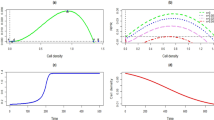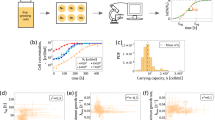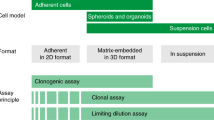Abstract
CELL density is of interest because it may have a critical role in the regulation of growth, development, and in malignant transformation. In cell culture, crowding slows and eventually stops cell proliferation of a variety of cells maintained on a solid surface1–5. This property is usually lost after malignant transformation1–5. Two major hypotheses have evolved to explain this phenomenon. The contact inhibition hypothesis holds that specific surface receptors are activated by cell–cell contact and generate a negative signal which halts further growth1–3. The humoral hypothesis proposes that high cell density limits the availability of medium components, particularly of growth factors present in serum4,5. Although much experimental evidence has been adduced in support of the humoral hypothesis, most experiments in which the effect of cell density on growth has been thoroughly investigated were performed in the presence of whole serum as the source of growth factors. The chemical complexity of serum leaves open the possibility that some of its effects may be exerted by molecules that interfere with inhibitory cell–cell contacts. Thus, definitive evidence for a humoral hypothesis in growth regulation in culture is still lacking. To circumvent this objection we have examined the effect of cell density in a model system in which chemically defined molecules rather than whole serum stimulate DNA synthesis and cell division in sparse or crowded cells arrested in G0/G1. We report here that density dependent inhibition of fibroblast growth is overcome by pure mitogenic factors.
This is a preview of subscription content, access via your institution
Access options
Subscribe to this journal
Receive 51 print issues and online access
$199.00 per year
only $3.90 per issue
Buy this article
- Purchase on Springer Link
- Instant access to full article PDF
Prices may be subject to local taxes which are calculated during checkout
Similar content being viewed by others
References
Dulbecco, R. in Growth Control in Cell Cultures (eds Wolstenholm, G. E. W. & Knight, J.) 71 (Churchill Livingstone, Edinburgh and London, 1971).
Noonan, K. D. & Burger, M. M. Prog. Surf. Membr. Sci. 8, 245 (1974).
Westermark, B. Biochem. biophys. Res. Commun. 69, 304 (1976).
Holley, R. W. Nature 258, 487 (1975).
Rozengurt, E. in Eukaryotic Cell Function and Growth (eds Dumont, J. E., Brown, B. L. & Marshall, N. J.) 711 (Plenum, New York, 1976).
Mierzejewski, K. & Rosengurt, E. Biochem. biophys. Res. Commun. 73, 271 (1976).
Huang, D. & Cuatrecasas, P. J. cell. Biol. 250, 8251 (1975).
Rubin, H. Proc. natn. Acad. Sci. U.S.A. 69, 712 (1972).
Todaro, G. J. & De. Larco, J. E. Nature 264, 26 (1976).
Bourne, H. R. & Rozengurt, E. Proc. natn. Acad. Sci. U.S.A. 73, 4555 (1976).
Author information
Authors and Affiliations
Rights and permissions
About this article
Cite this article
MIERZEJEWSKI, K., ROZENGURT, E. Density-dependent inhibition of fibroblast growth is overcome by pure mitogenic factors. Nature 269, 155–156 (1977). https://doi.org/10.1038/269155a0
Received:
Accepted:
Published:
Issue Date:
DOI: https://doi.org/10.1038/269155a0
This article is cited by
-
Role of cell shape in growth control
Nature (1978)
Comments
By submitting a comment you agree to abide by our Terms and Community Guidelines. If you find something abusive or that does not comply with our terms or guidelines please flag it as inappropriate.



